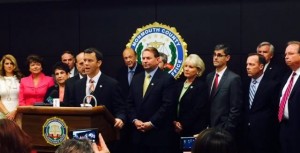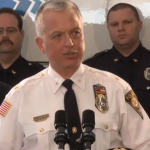Hospitals Join Law Enforcement In Fight Against Opiate Overdose Deaths
 Every hospital in Monmouth and Ocean Counties will exchange ready-to-use new doses of the overdose antidote naloxone, free of charge, for the empty syringes used to resuscitate the overdose victims, under a partnership agreement announced today by Acting Monmouth County Prosecutor Christopher J. Gramiccioni and Ocean County Prosecutor Joseph D. Coronato.
Every hospital in Monmouth and Ocean Counties will exchange ready-to-use new doses of the overdose antidote naloxone, free of charge, for the empty syringes used to resuscitate the overdose victims, under a partnership agreement announced today by Acting Monmouth County Prosecutor Christopher J. Gramiccioni and Ocean County Prosecutor Joseph D. Coronato.
The hospitals affiliated with Barnabas Health, Meridian Health and CentraState Medical Center are absorbing 100% of the cost of the antidotes exchanged with law enforcement officers, according to Charles Webster, spokesman for Gramiccioni’s office.
“Protecting our citizens is our most basic and fundamental function in law enforcement. We can’t do it alone, so we count on help from friends and partners who cooperate with us and who share, in some form or fashion, the same responsibility and commitment in helping to protect human life. It is these partnerships that make us even better. Through this partnership, our local hospitals are standing with us as we fight the deadly epidemic of heroin or prescription opiates drug overdoses,” Gramiccioni said.
“This partnership highlights the importance of our first responders, and will keep every officer equipped with the naloxone that has proven itself as an important weapon in our fight against these deadly overdoses. We are grateful they are joining law enforcement, helping ensure lives are saved, and keeping those officers armed and at the ready to aid an overdose victim,” Coronato said.
The partnership agreement, which takes effect today, will allow law enforcement officers to exchange one-for-one the empty naloxone syringes used to resuscitate the overdose victims for a ready-to-use new dose of the overdose antidote. In many cases, as per protocol, two doses are used in the resuscitation process. Thus, in those instances, two used doses will be exchanged for two new ready-to-use doses of naloxone.
The epidemic of prescription opiates and heroin continues to rise despite efforts to educate and eradicate the deadly problem. Last year, overdose deaths in Monmouth County rose from 75 in 2013 to 92 in 2014, despite the deployment of naloxone with law enforcement officers. Of these 92 overdoses in 2014, 72 were attributed to heroin or prescription opiates. Of the 75 overdose deaths in 2013, 69 were attributed to heroin or prescription opiates.
A comparison of the number of heroin or prescription opiates deaths to the number of naloxone deployments shows a chilling reality for the pervasiveness of the epidemic. In Ocean County, there were 129 deployments of naloxone in 2014, which resulted in 121 reversals and 8 deaths. In Monmouth County, 99 naloxone deployments saw 86 reversals and 13 deaths.
“We have a responsibility for saving lives, and that responsibility doesn’t start or end at the doors to our hospitals and health care facilities. We have an important stake in this partnership to help us meet the responsibility of keeping people alive,” said Timothy J. Hogan, Regional Hospital President, Monmouth County, Meridian Health.
For both Monmouth and Ocean counties, 2015 is shaping up to see more naloxone deployed with 98 and 142 deployments, respectively, occurring during the first half of this year.
“This partnership between law enforcement and the healthcare community is crucial in addressing this serious opioid epidemic. Naloxone is saving lives, however, the next step for Barnabas Health is utilizing intervention specialists in the hospitals to provide appropriate navigation for patients and their families into the next level of care, which includes detox and treatment,” said Joe Hicks, President and Chief Executive Officer of Barnabas Health Behavioral Health Services.
“This partnership makes sense. Police officers need to keep this antidote close by and shouldn’t have to wait to get back to the station house before they can respond to an overdose victim and save that life. We are proud to be a part of this partnership solution,” said Tom Scott, Senior Vice President and Chief Operating Officer at Centra State Medical Center.
Since April 2014, law enforcement officers in Monmouth and Ocean counties responded to no less than 468 opiate-related overdoses with a slightly better than 90 percent success rate. For those who have been treated with naloxone because of a heroin or prescription opiates overdose, the average age is 33 years old, with an age range from 15 to 78.
In many cases, police officers are the first to arrive on the scene of a potentially deadly heroin or prescription opiates drug overdose armed with the overdose antidote naloxone. Initially, the naloxone purchases were funded with money seized from criminal activity and retained in their respective County Law Enforcement Trust Accounts (CLETA), but that type of expenditure on a recurring basis is prohibited by law.
“Many lives have been saved in the past year. Monmouth and Ocean counties have been leading the charge in New Jersey against the opioid abuse epidemic, and today marks another example of leadership from Prosecutor Coronato and Prosecutor Gramiccioni that can save even more lives by including the support of area hospital systems,” said Angelo Valente, Executive Director of The Partnership for a Drug-Free New Jersey.











Art,
I just wanted to complment you on how nice your site is to visit since tht nasty dimwit from Neptune posting under various aliASSes stopped posting here a month or so ago.
I don’t know how you got rid of him, but good job.
money’d be better spent on the films, billboards, and other outreach methods to NOT use the damn drugs and get hooked in the first place? It is NOT ok for this terrible epidemic to keep on getting worse, and accommodated with temporary antidotes.. kids especially need to hear repeatedly: it is NOT cool to do this, and it WILL wreck your life, and that of your family, and will eventually,probably, kill you! Period.